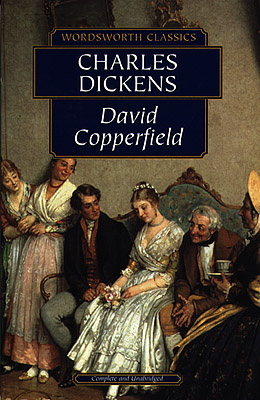Our book group for September 2010 is David Copperfield by Charles Dickens. David Copperfield is a bildungsroman, or coming-of-age novel, that tells the story of David Copperfield’s life from his childhood to his mature adulthood. The novel is set in England during the early 19th century and is narrated by David himself.
David is born in Blunderstone, Suffolk, six months after the death of his father. He is raised by his loving, childish mother and their kindly housekeeper, Clara Peggotty. They call him Davy.
David’s early years are happy and carefree. He spends his days playing with Peggotty’s nephew, Ham, and her niece, Emily. He also enjoys visiting his great-aunt Betsey Trotwood, who lives in Dover.
However, David’s happiness is shattered when his mother marries Mr. Edward Murdstone. Mr. Murdstone is a cruel and controlling man who takes a dislike to David. He sends David away to school, where he is bullied and mistreated.
When David returns home, he finds that his mother has died. Mr. Murdstone and his sister, Miss Murdstone, take over the household and make David’s life a living hell. They beat him, starve him, and make him work long hours in the warehouse.
One day, David’s mother’s friend, Mr. Micawber, comes to the house. Mr. Micawber is a kind and well-meaning man, but he is also very irresponsible. He is always getting into financial trouble, and he eventually runs away from his creditors.
David runs away from home and goes to live with his great-aunt Betsey Trotwood. Aunt Betsey is a strong-willed woman who takes David under her wing. She sends him to a good school and helps him to get a job in the law firm of Spenlow and Jorkins.
David Copperfield Discussion Questions
- Critics have noted that David Copperfield is less a character who makes things happen, and more one who witnesses things happening. Do you agree or disagree? How might this notion relate to David’s profession as a writer? Consider David Gates’s claim that David’s “colorlessness” makes him a convincing representation of a writer.
- David Copperfield, the narrator, begins his story by claiming that the succeeding pages will show whether he-or somebody else-will be the hero of his own life. Discuss the ways in which the notion of the hero is invoked throughout the novel. Who do you suppose might be David’s hero?
- Discuss the role of coincidence in David Copperfield. Specifically, discuss the novel’s re-introduction of characters (such as Mr. Micawber in Chapter XVII, Tommy Traddles in Chapter XXV, and Uriah Heep in Chapter LXI) who were seemingly forgotten. To what extent do you think Dickens represents the normal coincidences of everyday life? Consider John Lucas’s idea that the re-introduction of characters helps measure David’s growth as an individual.
- In David Copperfield, Dickens presents several relationships that fall outside traditional categories. For instance, the relationship between Betsey Trotwood and Mr. Dick; that of David, his mother, and Peggotty; and that of Mrs. Steerforth and Rosa Dartle. Discuss the role these relation-ships play in the novel. How does the novel define “family”? What makes up a family? Indeed, must the members of a “family” be related by blood?
- In William Wordsworth’s poem, “My heart leaps up, ” Wordsworth posits, “The Child is father of the Man.” Discuss this notion in relation to David Copperfield.
- Discuss the role of female characters in David Copperfield. Compare David’s relationship with such women as his mother and Peggotty, Agnes and Dora. How are they similar? Different? Historians have noted that middle-class Victorian culture relegated women to the private world of the home and imagined that women provided a moral center for the family, offsetting a husband’s exposure to the amoral marketplace. In what specific ways do you think Dickens might be constrained by this idea of woman as “angel of the house”?
- In the beginning of Chapter II, David finds “the power of observation in numbers of very young children to be quite wonderful for its closeness and accuracy.” He then stops himself to say: “I might have a misgiving that I am ‘meandering’ in stopping to say this, but that it brings me to remark that I build these conclusions, in part upon my own experience of myself; and if it should appear from anything I may set down in this narrative that I was a child of close observation, or that as a man I may have a strong memory of my childhood, I undoubtedly lay claim to both of these characteristics.” Discuss the significance of this passage. Why might David need to claim “a strong memory” for himself? Consider David Gates’s assertion, in his Introduction to this volume, that David’s lapses in memory help make his story more believable.
- Discuss David’s relationship with Steerforth. In what specific ways is Steerforth a foil for David himself?
- David Copperfield offers, among other things, a critique of the nineteenth-century English prison system, in part through Mr. Micawber, Uriah Heep, and Mr. Creakle. What are David’s attitudes to the prison he visits in Chapter LXI? Do the prisoners seem repentant to him? Compare nineteenth-century attitudes toward incarceration with contemporary ones. How is the prison David visits similar to and different from prisons today? Discuss Chapter LXI’s relevance to the novel as a whole. What does Dickens accomplish by re-introducing Mr. Creakle, Uriah Heep, and Mr. Littimer?

